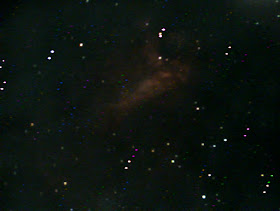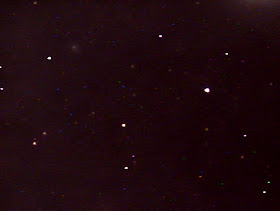I am getting better at this business of astrophotography. Never though I say this but I am slowly but surely crossing over to the dark side...that is the dark side of astrophotography. It all started a year ago on Memorial Day when I made a conscious decision to acquire an Orion Starshoot Lunar and Planetary webcam imager. That did not work out too well with my short focal length newtonian's (read
previous posts). The deal breaker for me was getting a used Meade DSI I color one shot off Astromart. This is one brilliant little performer...a real gem. My last post highlights the
DSI. Then came the fabulous Costco Celestron NexStar 102GT. The rest is history. Over the course of a few months I have gone from capturing simple open clusters to more complex fare such as galaxies and fainter nebulae. I have also come to grips with imaging from light polluted skies with my trusty Orion SkyGlow filter. I have lately been investing heaps of time in post image processing with photoshop, learning the finer points of bringing out data that is there but invisible. Basically this involves finding the darkest point and lightest point of the image, stretching the histogram at small baby steps using the curves function, using levels to adjust the background and bring out even more detail, correcting color balance to obtain more natural looking colors and finally dark subtraction for electronic noise (still a bit of an issue for me but getting there). Anyway I though I would post before and after piccie to illustrate what can be achieved using a simple setup. All of my shots are 6x15sec stacks unless noted. My current astrophotography arsenal comprises of:
- Costco Celestron NexStar 102GT long focal length refractor
- Meade DSI I one shot color CCD camera
- HP Pavillion laptop
M16 Eagle Nebula in Sagittarius
M17 Swan Nebula in Sagittarius
M27 Dumbbell Nebula in Vulpecula
NGC 4361 Planetary in Corvus
M97 Owl Nebula Planetary in Ursa Major
M104 Sombrero Galaxy Virgo
M66 galaxy Leo
M57 Ring Nebula Lyra
M81 Bode's Galaxy Ursa Major
M82 Galaxy Ursa Major





















